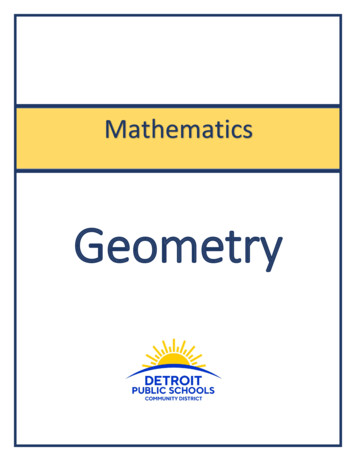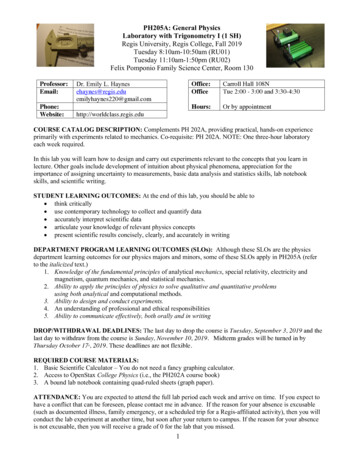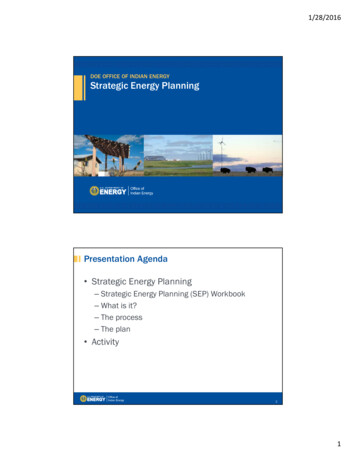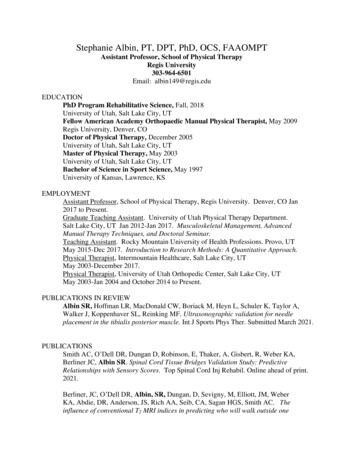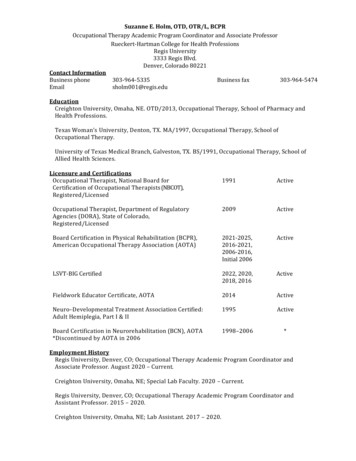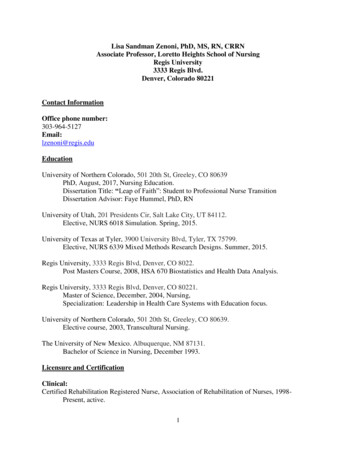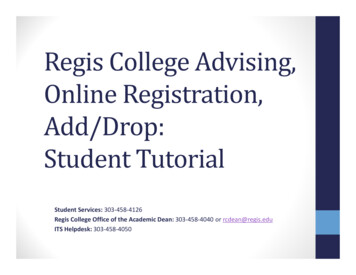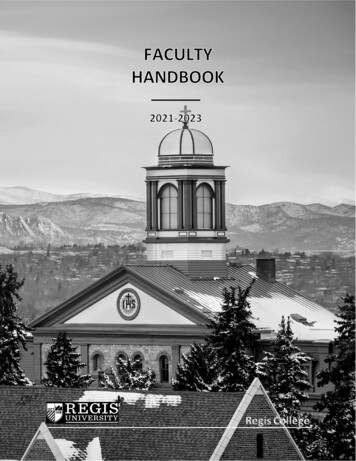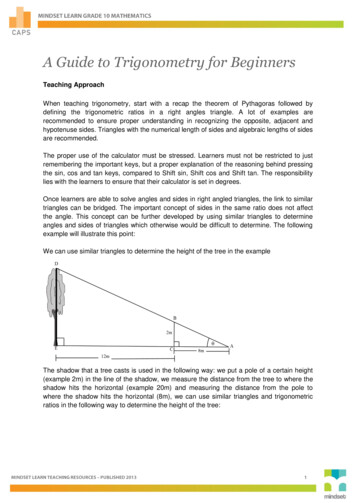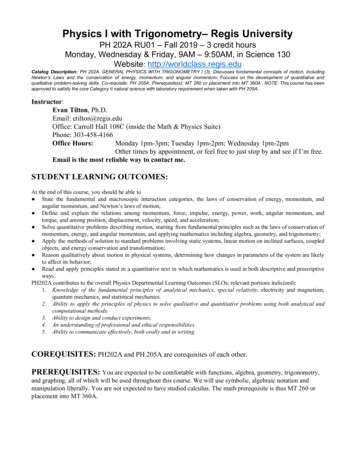
Transcription
Physics I with Trigonometry– Regis UniversityPH 202A RU01 – Fall 2019 – 3 credit hoursMonday, Wednesday & Friday, 9AM – 9:50AM, in Science 130Website : http://worldclass.regis.eduCatalog Description: PH 202A. GENERAL PHYSICS WITH TRIGONOMETRY I (3). Discusses fundamental concepts of motion, includingNewton’s Laws and the conservation of energy, momentum, and angular momentum. Focuses on the development of quantitative andqualitative problem-solving skills. Co-requisite: PH 205A. Prerequisite(s): MT 260 or placement into MT 360A . NOTE: This course has beenapproved to satisfy the core Category II natural science with laboratory requirement when taken with PH 205A.Instructor : Evan Tilton , Ph.D.Email: etilton@regis.eduOffice: Carroll Hall 108C (inside the Math & Physics Suite)Phone: 303-458-4166Office Hours:Monday 1pm-3pm; Tuesday 1pm-2pm; Wednesday 1pm-2pmOther times by appointment, or feel free to just stop by and see if I’m free.Email is the most reliable way to contact me.STUDENT LEARNING OUTCOMES:At the end of this course, you should be able to State the fundamental and macroscopic interaction categories, the laws of conservation of energy, momentum, andangular momentum, and Newton’s laws of motion; Define and explain the relations among momentum, force, impulse, energy, power, work, angular momentum, andtorque, and among position, displacement, velocity, speed, and acceleration; Solve quantitative problems describing motion, starting from fundamental principles such as the laws of conservation ofmomentum, energy, and angular momentum, and applying mathematics including algebra, geometry, and trigonometry; Apply the methods of solution to standard problems involving static systems, linear motion on inclined surfaces, coupledobjects, and energy conservation and transformation; Reason qualitatively about motion in physical systems, determining how changes in parameters of the system are likelyto affect its behavior; Read and apply principles stated in a quantitative text in which mathematics is used in both descriptive and prescriptiveways.PH202A contributes to the overall Physics Departmental Learning Outcomes (SLOs; relevant portions italicized):1. Knowledge of the fundamental principles of analytical mechanics, special relativity, electricity and magnetism,quantum mechanics, and statistical mechanics.2. Ability to apply the principles of physics to solve qualitative and quantitative problems using both analytical andcomputational methods.3. Ability to design and conduct experiments.4. An understanding of professional and ethical responsibilities5. Ability to communicate effectively, both orally and in writingCOREQUISITES: PH202A and PH 205A are corequisites of each other.PREREQUISITES: You are expected to be comfortable with functions, algebra, geometry, trigonometry,and graphing, all of which will be used throughout this course. We will use symbolic, algebraic notation andmanipulation liberally. You are not expected to have studied calculus. The math prerequisite is thus MT 260 orplacement into MT 360A.
COURSE MATERIALS:Required materials: You must have: Pens or pencils and paper or notebooks for working problems, both in class and as homework. A scientific calculator. Exams, homework, and in-class exercises will require numeric calculations.It is your responsibility to understand how to use your calculator prior to exams. Access to a computer with internet capabilities. Materials will be posted on WorldClass and sentout via email, and other websites will be used occasionally. You are expected to be able to downloadfiles from both locations and check your Regis email frequently. You may be required to use Excel(or similar) to organize data; laptops are available for use in the classroom.Required text: OpenStax College Physics by Urone, Hinrichs, Dirks, Sharma, et al. (PrintISBN:978-1-938168-00-0; Digital ISBN:978-1-947172-01-2). It is freely available online athttps://openstax.org/details/college-physics . If you dislike digital books, a printed edition can bepurchased online for a modest fee. Be sure to look at the Student Resources section of the website( nt%20resources ), which has useful tools such as aSolution Manual for practice problems.Additional resources:o The Learning Commons: The Learning Commons offers free, in-person and online tutoring for allstudents. I highly recommend this resource for help with math and physics! They usually post theirschedule after the first week of classes, so keep an eye out for that. They offer help via three mainways:1. The Writing Center: They work with writers in all subjects and at any stage, from brainstormingto rough drafts to polishing a final draft.2. Tutoring: They offer one-on-one sessions and study groups. Subjects include math, biology,physics, chemistry, nursing, pharmacy, computer science, business, neuroscience, psychology,humanities, languages, communication, critical reading, and study skills.3. Academic Success Workshops offered include study skills, time management, APA, and more.For more information and to make an appointment, visit regis.edu/tlc or contact them attlc@regis.edu.GRADING :The course grades will be broken down into six categories:1. 30% Midterm exams (3 total)2. 15% Cumulative final exam3. 15% Participation4. 40% HomeworkAAB BBC Outstanding scholarship.Strong command of material. 8885 – 8882 – 84.9978 – 81.9975 – 77.9972 – 74.99CCD DDFSatisfactory command of material.Unsatisfactory command of material.No credit.68 – 71.9965 – 67.9962 – 64.9958 – 61.9955 – 57.99 55You can expect your overall course grade to correspond to the above letter grades. However, I reservethe right to assign higher grades than would result from this table according to my judgement of thedifficulty of the assignments. If necessary, the overall course grade distribution at the end of the
semester will be adjusted to ensure that a minimum of 80% of students receive a grade of C- or better.No final grades will be adjusted or curved downward relative to the above table under anycircumstances. For example, if everyone earned above an 88%, then everyone would get an A, so it is inyour interest to work together and help each other learn physics. The contributing categories are asfollows: Midterm exams : There will be three midterm exams. Tentative, approximate exam dates aregiven on the schedule in this syllabus. Firm exam dates will be announced 2-3 classes inadvance. These exams will test your understanding of the content from assigned readings, classtime, and homework problems. Exams could include a variety of types of questions, includingbut necessarily not limited to:o Qualitative, conceptual questions that may be either multiple choice, multiple choice withexplanation, short answer, etc. These types of questions will be similar to the conceptualquestions in the textbook, conceptual questions I ask you in class or on homework, andin-class activities.o Quantitative problems similar in scope to the in-class example and assigned homeworkproblems.The exams will not be tests of what you can memorize; they will require you to apply theprinciples that you have learned to new situations that you have never seen before . A key partof your studying should thus be solving problems that you have never seen before withoutlooking at the solution until you have solved it yourself. All midterm exams are cumulative, butthey will focus most heavily on material introduced since the previous midterm.For each exam, you may bring a single, hand-written equation sheet, no larger than bothsides of an 8.5x11inch piece of paper. Equation sheets will be collected with the exam andreturned to you after the exam is graded. Your sheet may not contain fully-worked exampleproblems. Equation sheets that include fully worked example problems or other significantlynon-reminder-like information will be penalized with a substantial reduction of your exam scoreper my discretion. Calculators without internet access or communication capabilities arepermitted during exams. No other electronic devices, including smartphone calculators, arepermitted during exams (except as accommodations for documented disabilities per Regis’saccessibility policies).Students may only make-up a missed exam if adequate documentation is provided for anexcused absence BEFORE the exam day (e.g., Regis sponsored activities, such as sports, travelto academic conferences, etc., illness that can be verified by a doctor’s note, death in the family,etc.). I will follow-up on any documentation that you provide and then decide if your absence isexcused; if it is, we will work together to schedule the soonest possible time to make-up themissed exam. The make-up exam may be different from the in-class exam, at my discretion. Final exam : The cumulative final exam will take place on December 13 at 8am and will have amore holistic focus on the course’s material. (I’m sorry for the time; I can’t change it,unfortunately, because it is set at the university level.) Participation : Because we will explore a large variety of topics and activities in class, includingsome that will not be practiced in any other context, I expect that you will attend and participatefully in every class. More than 8 unexcused absences (about 20% of the course) may result inautomatic failure of the course.You will have an online reading survey to complete every time that there is a readingassignment; these will contribute to your participation score. Additionally, we will use Plickersto answer questions in class -- these will be graded for participation but not correctness.However, I am well aware that stuff comes up for everyone sometimes, so I will dropyour three lowest participation grades. However, I strongly advise that you do not miss classunless absolutely necessary – skipping classes is a recipe for disaster. Excused absences due to
athletics, Regis sponsored activities, and medical absences with sufficient documentation(hardcopies and emails submitted in advance) will be taken into consideration and excused whenappropriate, in accordance with Regis policy and my discretion. Regardless of the reason, youalone are responsible for getting and understanding all material from the missed classes. Homework: Homework is the most important activity for learning physics. Physics is a skillrather than something that can be memorized, so you must practice it daily, just like a sport ormusical instrument. Homework will be assigned nearly every week. All homework will be of theold-fashioned written variety and should be turned in on paper. Written homework is always dueat the beginning of class on the due date. No late homework will be accepted. You should solveproblems habitually, as you encounter new concepts, rather than letting it pile up until the lastminute. You should use a diversity of resources to help you with homework: visit me in officehours, schedule time with the free physics tutors, and collaborate with friends. You should alsotreat homework as the bare minimum number of problems you need to solve; most people willneed to solve more practice problems to sufficiently prepare for exams.To ensure a quick grading turn-around time, a randomly selected subset of the assignedproblems may be graded on some occasions.In addition to seeking help from me or tutors, you are encouraged to collaborate onhomework within the guidelines for academic integrity . While everyone understands what thehonor code means on quizzes and exams, there is often confusion on what it means forhomework. Students are encouraged to work together on homework, but your write-ups andsubmissions must be independent. Copying, whether by hand or cut-and-paste on your computer,constitutes cheating, and will be handled accordingly. The best way to ensure you understand theassigned material (on which you will be tested later!) is to split off from the group when writingup or submitting your answers. A good approach is to try the problems on your own, collaboratewith a group to figure out what approach will solve the harder ones, and then split off toimplement and write-up that solution on your own. Anyone that you collaborated with mustbe acknowledged in writing on the assignment. When in doubt about plagiarism, quoting, orcollaboration, consult with me – getting a homework problem done a few minutes quicker isnot worth potentially irreparable damage to your college career because you got caughtcheating!Problems will be graded for both correctness and clarity. It is not enough to arrive at acorrect answer; you must show a logical process that starts from known, identi ed physicsprinciples. Your solutions must be written clearly and include diagrams where appropriate. Youmust work the problems with algebraic symbols before substituting in numbers. If a number hasunits, you must write them together with the number (every time). Once we cover the topic, youare expected to use vector notation correctly, maintaining the distinctions among a vector, itscomponents, and its magnitude. In particular, please remember that a vector can never beconnected to a scalar by an equals sign, since they are fundamentally different classes ofmathematical objects, and that the magnitude of a vector can never be a negative number,although any of the components of the vector can be negative. If the problem has a numericalresult, credit will be deducted if the answer is unreasonable unless you explain that it isunreasonable.More specifically, each graded problem (with the exception of initial “math review”assignments) will be graded for: Completeness and Clarity (30%) – Is each part of the problem fully addressed in agood faith effort? Regardless of correctness, is your reasoning transparent enough,via the words or diagrams, for a peer to understand it? Model (20%) – Is your solution using the correct physical principles and applyingthem correctly?
Good Notation (20%) – Is your algebra conducted fully with algebraic symbols?Are units included wherever necessary? Are vectors notated correctly? Valid Math (20%) – Are all math steps shown, and are they correct? Plausibility (10%) – Does your result have a plausible sign, magnitude, and/orunits? If not, have you noted that you recognize it as implausible and why?Additionally, after the solutions have been posted, homework may be corrected with acolor-contrasting pen or pencil up until the next homework due date. Up to 75% of lost creditin the Model and Valid Math categories may be earned back. This means, for example, that ifyour initial attempt is entirely incorrect but well explained, plausible, and correctly notated, youmay receive a 60% for the problem due to no credit in Model and Valid Math but full credit inthe other categories. This 60% can be raised back up to 90% if you correct your work in light ofthe solutions. However, you may not simply copy the solutions onto your paper; you mustcarefully show how you erred and how it should be fixed. For example, you might writesomething like “In this step, I assumed constant velocity. However, I should have included theacceleration due to the force of friction. Taking this into account, the equation becomes .”If your solution reflects a lack of careful attention in general, due to problems such asillegibility, it may simply be returned ungraded. Problems that are given zero credit forinsufficient attention may not be corrected for credit at all.This grading system rewards good-faith efforts at engaging with the problems. Becauseyou have multiple opportunities to engage with and revise the problem, I will not commentextensively on the work when I grade it; you are expected to review the solutions online andrevise appropriately. You are always welcome to seek help with these tasks in office hours.CLASSROOM GROUND RULESFor the benefit of your fellow students and your instructor, you are expected to practice commoncourtesy in all course interactions. For example:o Act as mature and responsible adults always.o Show up to class on time and be prepared to learn when class starts.o Unless directed to do so, don’t leave class early and don’t start packing up before classends .If you follow these requests, I will be able to always extend similar courtesies to you, such as alwaysending class on time and dealing with you as responsible individuals and as adults.Additionally, please observe these additional policies: Electronics usage: It is strongly suggested that you use no electronics during class other thanthose required for the day’s activities. However, I understand that there are potentially goodreasons that you may feel that electronics usage benefits your personal study habits. You arewelcome to use phones, tablets, or laptops in class for notetaking, accessing the ebook, or otherapproved uses, however you may only use those devices for those purposes. Other uses are notallowed and will result in your being asked to leave to avoid distracting others. Diversity and Inclusion: A commitment to inclusivity will be especially important in ourclassroom, which will feature frequent group collaboration. I as an instructor and we as a classvalue diversity of backgrounds, opinions, and experiences. I embrace the diversity of race, age,culture, religion, politics, veteran status, sexual orientation, gender identity and genderexpression, disability, and nationalities, as well as other visible and invisible categories, that youbring with you to our shared study of physics. I expect that all students will contribute to awelcoming, respectful, and inclusive environment. This shared responsibility for respect and
inclusion is necessary for the free exchange of ideas and learning, and it is a core feature of aneffective learning environment.Class rosters are provided to the instructor with the student's legal name. I and the rest ofthe class will gladly honor your request to address you by an alternate name or gender pronoun.Please advise me of this preference early in the semester so that I may make appropriate changesto my records, and feel free to correct me any time that I make a mistake.The following are a few basic social guidelines that make explicit certain norms of socialbehavior that help uphold the values listed above. If you mess up on any of the below, don’tpanic: we all, including all your instructors, make mistakes sometimes. Apologize, reflect, moveforward.1. Raise all voices. During group work and discussions, pay attention to who is contributing.Invite contributions from quieter members of the group, and be conscientious of notdominating the conversation. I understand that it can be exciting to discuss a new idea, butalways strive to listen (rather than just waiting your turn to speak).2. No feigning surprise. In a learning environment, it is very important that people feelcomfortable saying “I don’t know” or “I don’t understand.” Therefore, please do not actsurprised when someone says they don’t know something, whether it is regarding a technicalor non-technical subject (e.g. “What?! I can’t believe you don’t know what X is!”). Feigningsurprise has no social or educational benefit: it only makes others feel worse.3. No “well-actually’s.” A 'well-actually' happens when someone says something that's almost(but not entirely) correct, and you say, 'well, actually.' and then give a minor correction.Well-actually’s interrupt the discussion and fixate on a minor, usually irrelevant point, oftensolely to make the person delivering the well-actually feel more important. If you feel theneed to correct someone, take a moment to consider whether your correction is in the spirit oftruth-seeking, rather than grandstanding, and whether it will provide a positive contributionto the discussion.4. Racism, sexism, homophobia, transphobia, ableism, ageism, and other kinds of bias —whether these behaviors are overt or subtle — are not allowed. Subtle -isms can beparticularly tricky, as they are often unconscious behaviors we engage in by mistake, and aresometimes caused by conflicting norms between cultures. To use an example, saying "It's soeasy my grandmother could do it" is a subtle -ism. If you experience these behaviors duringthe course, you should feel free to bring it up directly with the person, or if it’s morecomfortable, point out the behavior to me, another faculty member, or the Office ofCounseling and Personal Development. If someone points out that you have engaged in thisbehavior, it can be tempting to become defensive— but instead, I ask that you apologize,reflect a moment, and move on. If you do not understand why issue was taken with yourbehavior, it is fine to discuss it with me and/or the class in a respectful, inclusive manner sothat everyone can learn from the experience. Learning support and accommodations: Regis has a general policy for disabilityaccommodation (reproduced below). However, if contacting Disability Services places an undueburden on you, I will do my best to work with you directly and/or work directly with DisabilityServices – feel free to discuss with me what accommodations will help you succeed in our class.My goal is to make sure everyone has every possible opportunity to succeed, and I’ll do my bestto make that happen. Religious observances: As part of our commitment to inclusion and diversity, I will make everyeffort to deal reasonably and fairly with all students who, because of religious obligations, haveconflicts with scheduled exams, assignments or required attendance. However, I will be able tobetter accommodate you the earlier you inform me of the conflict, so please speak to me aboutyour religious obligations as early as possible if our class conflicts with them in any way.
UNIVERSITY-WIDE POLICIES:The following policies are set at a university level and apply to all of your classes.Key dates: The add/drop deadline is September 3. The withdrawal deadline is November 10. Midterm grades aredue October 17.Academic Honor Code : All members of the Regis University community exhibit the qualities of honesty,loyalty and trustworthiness in all academic activities, holding themselves and each other accountable for theintegrity of the learning community. Regis University students are committed to the highest standards ofacademic integrity and assume full and complete responsibility for maintaining those standards in the academicenvironment.Academic integrity violations: Violations of academic integrity are taken very seriously and include cheating,plagiarism, fabrication, collusion and other forms of academic misconduct. All violations will be reported withappropriate sanctions applied. Sanctions can include, but are not limited to failure of an assignment, failure of acourse, removal of academic honors, or review of the Academic Integrity Tutorial. For more serious violations,program suspension, College dismissal or University expulsion may be imposed. Refer to the Regis CollegeOffice of the Academic Dean for further information. This Academic Honor Code applies to any student enrolledin a course at Regis University or one of its university partners, regardless of the student’s home college orprogram, and will be enforced according to the policies and procedures outlined in the University xIt is the responsibility of each student to review all aspects of the course syllabus and agree to adhere tothe Academic Honor Code. In doing so, the student acknowledges that the work represented in all examinationsand other assignments is his or her own and that he or she has neither given nor received unauthorizedinformation. Furthermore, the student agrees not to divulge the contents of any examination or assignment toanother student in this or ensuing semesters.Learning Support: If you have a documented disability requiring academic adjustments, please contact Dr. JoieWilliams, Director of Disability Services (303-964-3666, mbwillia@regis.edu, Clark Hall 225). She will reviewyour documentation with you and help determine appropriate, reasonable accommodations. Following themeeting with Dr. Williams, please make an appointment with your instructor to discuss your accommodationrequest in light of the course requirements. You may self-disclose and request academic adjustments at any timeduring the semester. However, it is strongly recommend that you do so as soon as possible becauseaccommodations are not provided retroactively and adequate lead-time is required.Counseling : During the semester, if you find that life stressors are interfering with your academic or personalsuccess, consider contacting the Office of Counseling and Personal Development (OCPD). All full-timetraditional undergraduate students are eligible for counseling services at no charge. OCPD is located in the CoorsLife Direction Center, Room 114 and can be contacted by phone 24/7 at 303-458-3507. For more information, seewww.regis.edu/ocpd .Diversity and Inclusion : At Regis University the term “diversity” affirms our Jesuit commitment to build aninclusive community that values the dignity and contributions of all our members. We strive to shape a learningenvironment characterized by the Jesuit traditions of mutual respect and the pursuit of social justice, recognizingthat our various identities and experiences, including but not limited to age, gender, race/ethnicity, class,disability, sexual orientation, religion and other forms of human difference, contribute to the richness and vitalityof our Regis community, and those we are connected to locally, nationally, and globally. In accordance with ourJesuit Catholic mission, we commit ourselves to maintaining a humane atmosphere, where the human rights ofevery individual are recognized and respected. We desire that same commitment to be instilled in each member of
our community and demonstrated through our words and actions. Should an individual ever feel as though thesevalues are not being upheld in the academic or residential environment, we encourage that person to bring it to theOffice of Diversity, Engagement and Inclusion in the Student Center, Suite 219; diverse@regis.edu or303-964-6211.Title IX and Regis’s Nondiscrimination and Sexual Misconduct Policy: In the event that you choose to writeor speak about having survived sexualized violence, including rape, sexual assault, dating violence, domesticviolence, or stalking and specify that this violence occurred while you were a Regis student, federal and stateeducation laws require that, instructors notify the Regis University Title IX Coordinator, Michelle Spradling. Shewill contact you to let you know about accommodations and support services at Regis and requirements forholding accountable the person who harmed you. To learn more about Title IX, explicitly at Regis, go .aspxIf you do not want the Title IX Coordinator notified, instead of disclosing this information to your instructor, youcan speak confidentially with counselors in the Office of Counseling and Personal Development (see below) andthe Blue Bench, a community agency that focuses on sexual assault and sponsors a 24/7 hotline. They can connectyou with support services and discuss options for holding the perpetrator accountable. The number is303-322-7273.Incomplete policyIf unforeseen circumstances occur, and a student is unable to complete the required work for the course, an“Incomplete” grade may be submitted. A request must be made in writing and approved by the instructor. Therequest will include a timeline and plan for completing the work. The incomplete grade will reflect the gradeearned in the course to this point ( an “I” with whatever grade earned, including the missing work: an IF or ID orIC) and will only change when the plan is completed. Please see the University Catalog for more of the fullpolicy: “A grade of an Incomplete or “I” denotes that the required work for the course is incomplete due tounforeseen circumstances” (emphasis added), which means “an accident, an illness, a death or major lifetransaction has occurred.”QUESTIONS & PROBLEMS: Please don’t hesitate to get in touch with me if you have questions about anyaspect of the class or if you start running into difficulties following the material or keeping up with assignments –remember, I’m here to help! I can’t help you address the problems you’re having if I don’t know that theyexist!TENTATIVE COURSE SCHEDULE:A very tentative schedule, subject to change at any time:
Email: etilton@regis.edu Office: Carroll Hall 108C (inside the Math & Physics Suite) Phone: 303-458-4166 Office Hours: Monday 1pm-3pm; Tuesday 1pm-2pm; Wednesday 1pm-2pm Other times by appointment, or feel free to just stop by and see if I'm free. Email is the most reliable way to contact me. STUDENT LEARNING OUTCOMES:
